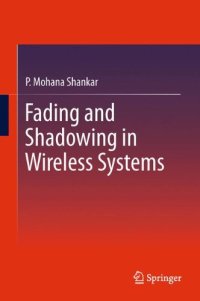
Ebook: Fading and Shadowing in Wireless Systems
Author: P. Mohana Shankar (auth.)
- Tags: Communications Engineering Networks, Coding and Information Theory, Information and Communication Circuits
- Year: 2012
- Publisher: Springer-Verlag New York
- Edition: 1
- Language: English
- pdf
The study of signal transmission and deterioration in signal characteristics as the signal propagates through wireless channels is of great significance. The book presents a comprehensive view of channel degradation arising from fading and shadowing. Various statistical models including simple, hybrid, compound, complex and cascaded ones are presented with detailed derivations along with measures to quantify the deterioration such as the amount of fading, error rates and outage probabilities. The models range from the Rayleigh and Rician through Suzuki, generalized K, cascaded and alpha-mu and similar ones. This is followed by the analysis of mitigation of fading and shadowing through diversity (simple, hybrid, micro- and macro- level) and combining algorithms. The density and distribution functions, error rates and outages are derived and results analyzed to quantify the improvements. The effects of co-channel interference before and after the implementation of diversity are also analyzed. To facilitate easy understanding of the models and analysis, the background information in terms of probability and random variables is presented with relevant derivations of densities of linear and nonlinear transformation of random variables, the sums, products, ratios as well as order statistics of random variables of all types. The book also provides material on digital modems of interest in wireless systems. Thus, the book with 1100+ equations and 350+ Matlab generated figures and tables is an ideal source for students, educators, researchers and professionals in wireless communications allowing access to information currently unavailable.
The study of signal transmission and deterioration in signal characteristics as the signal propagates through wireless channels is of great significance. The book presents a comprehensive view of channel degradation arising from fading and shadowing. Various statistical models including simple, hybrid, compound, complex and cascaded ones are presented with detailed derivations along with measures to quantify the deterioration such as the amount of fading, error rates and outage probabilities. The models range from the Rayleigh and Rician through Suzuki, generalized K, cascaded and alpha-mu and similar ones. This is followed by the analysis of mitigation of fading and shadowing through diversity (simple, hybrid, micro- and macro- level) and combining algorithms. The density and distribution functions, error rates and outages are derived and results analyzed to quantify the improvements. The effects of co-channel interference before and after the implementation of diversity are also analyzed. To facilitate easy understanding of the models and analysis, the background information in terms of probability and random variables is presented with relevant derivations of densities of linear and nonlinear transformation of random variables, the sums, products, ratios as well as order statistics of random variables of all types. The book also provides material on digital modems of interest in wireless systems. Thus, the book with 1100+ equations and 350+ Matlab generated figures and tables is an ideal source for students, educators, researchers and professionals in wireless communications allowing access to information currently unavailable.